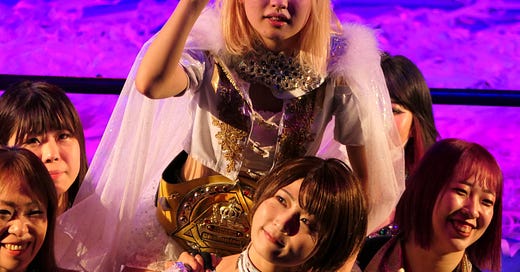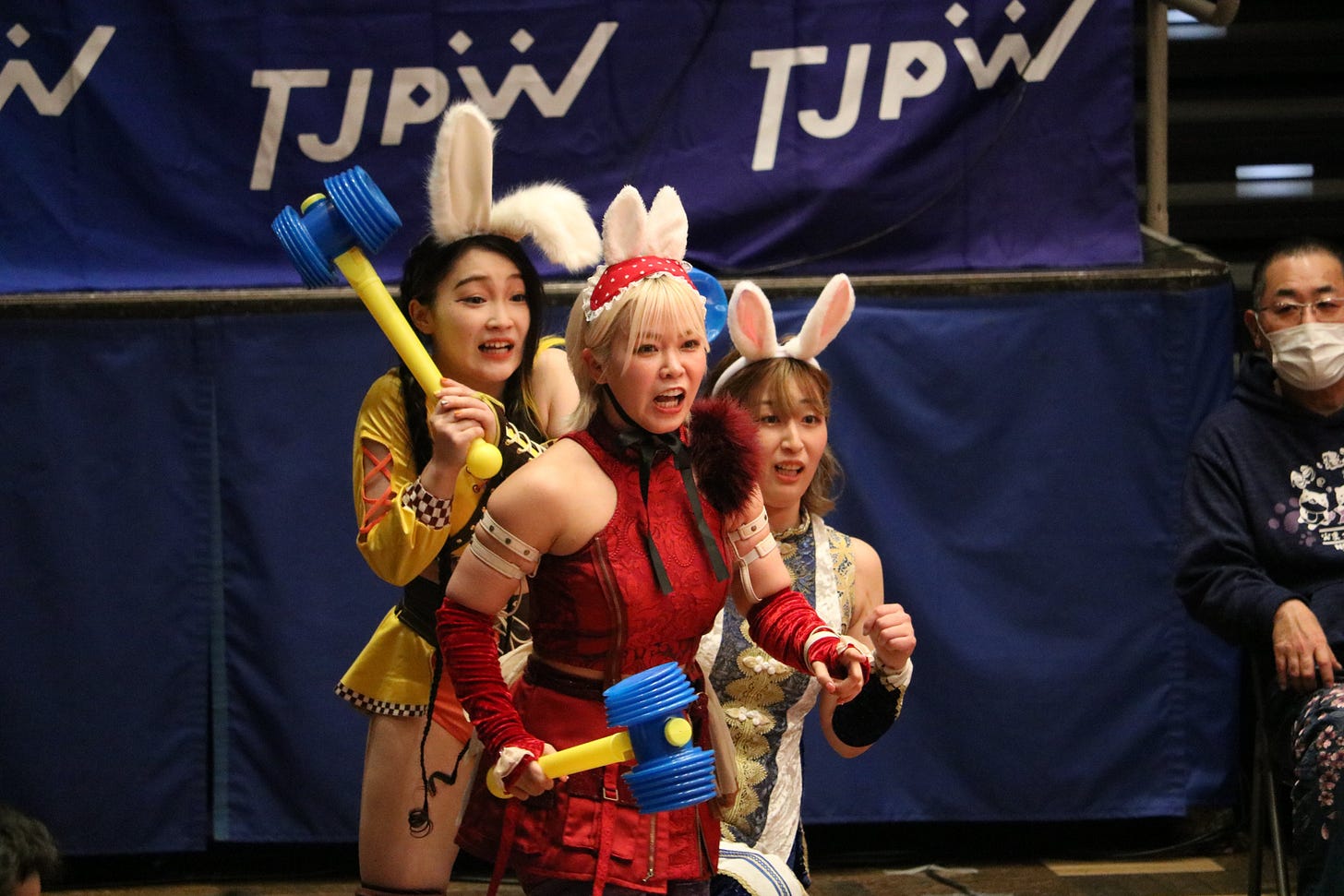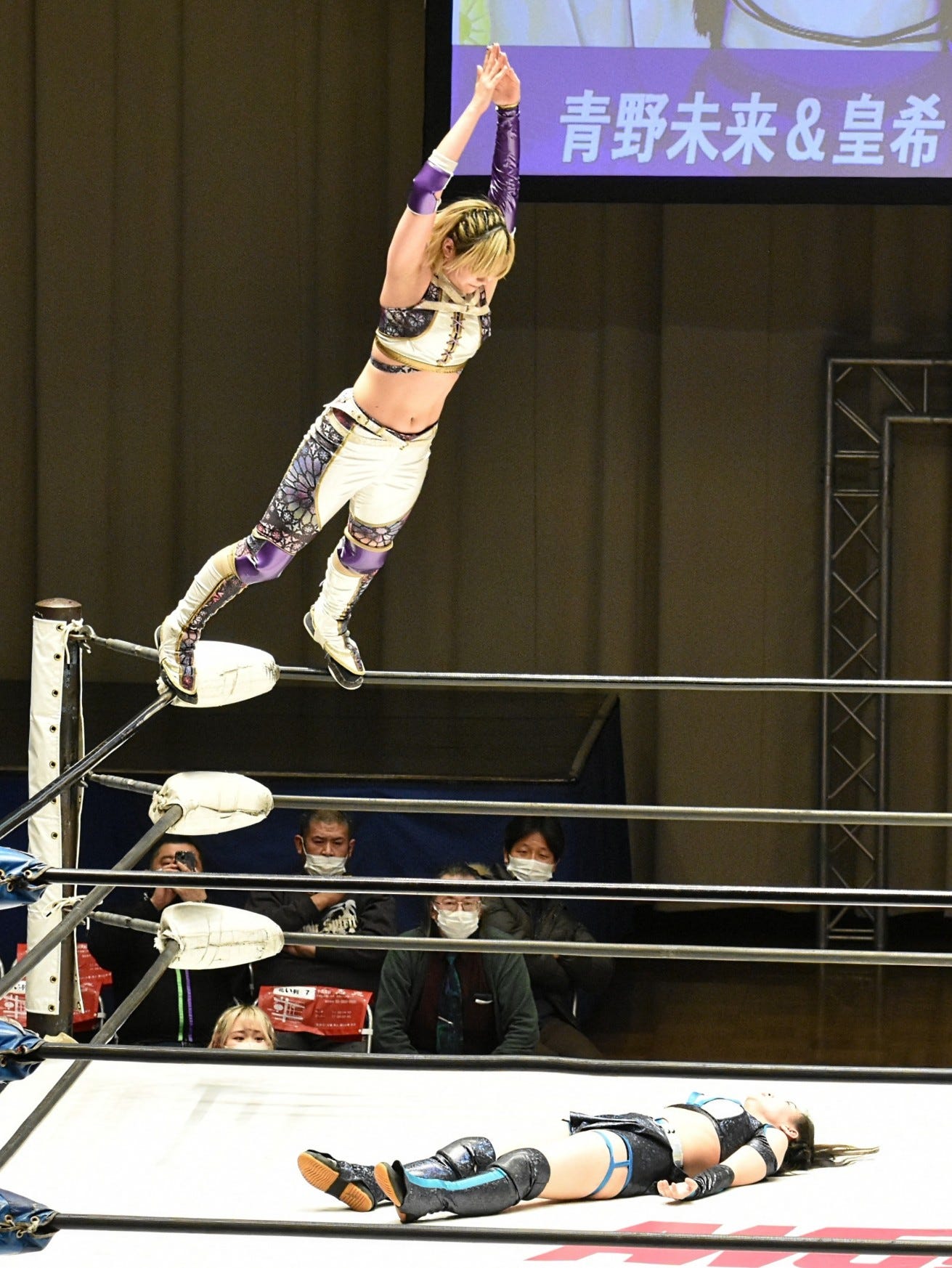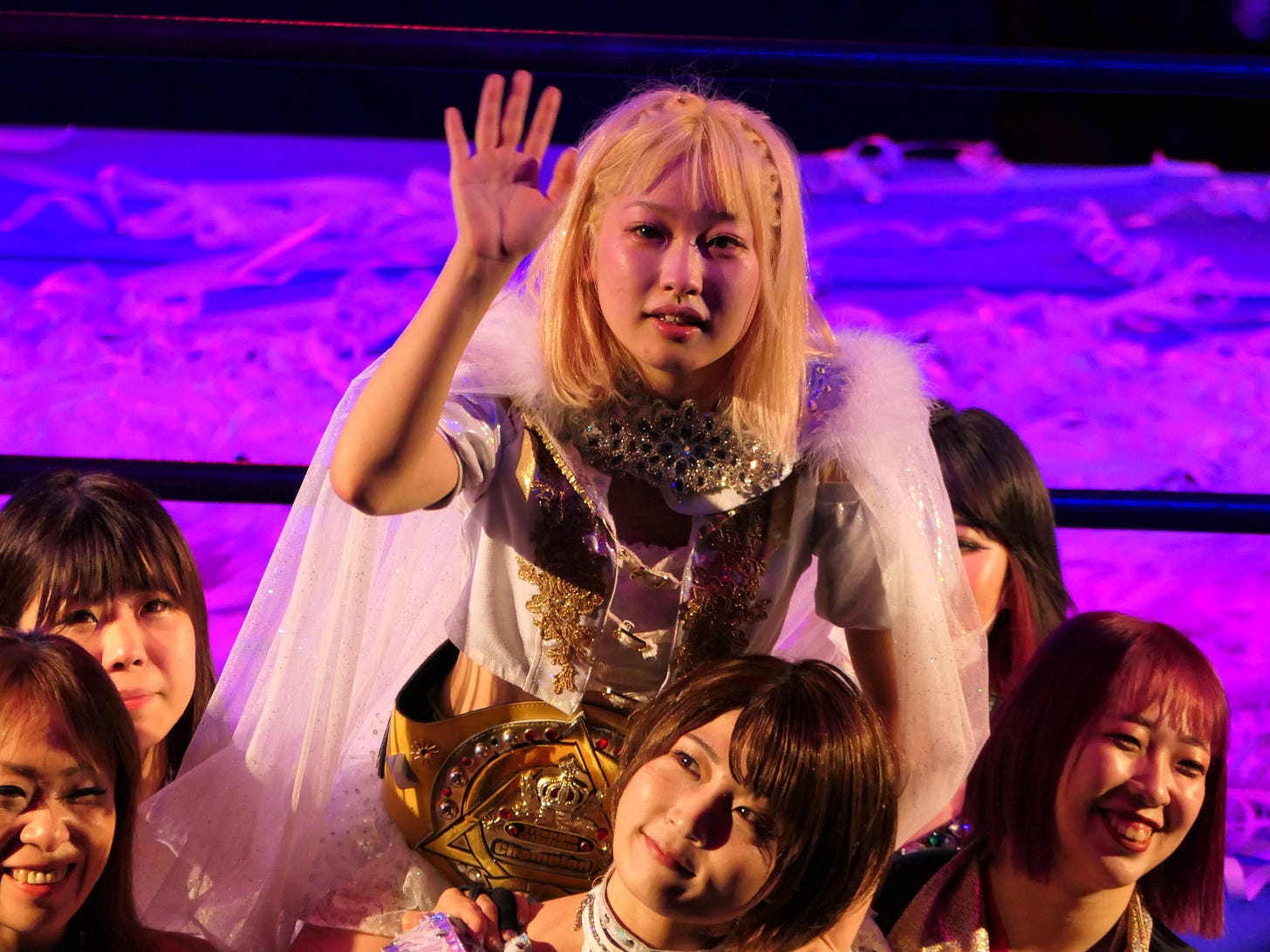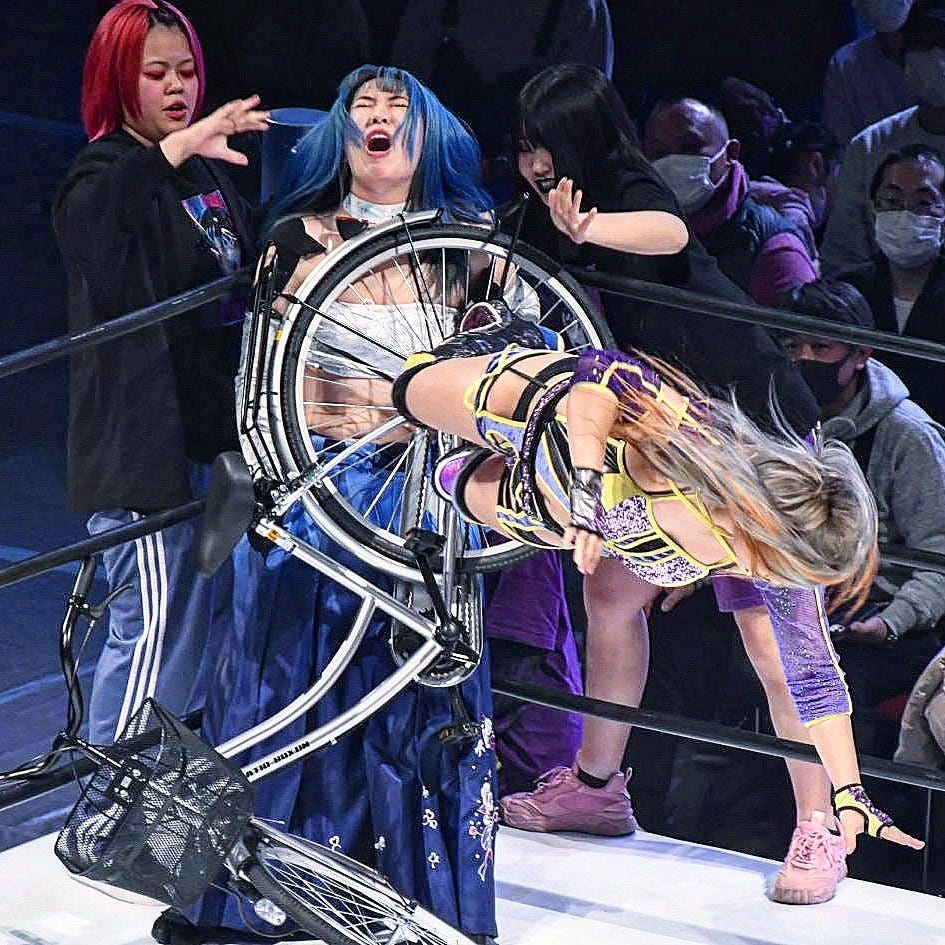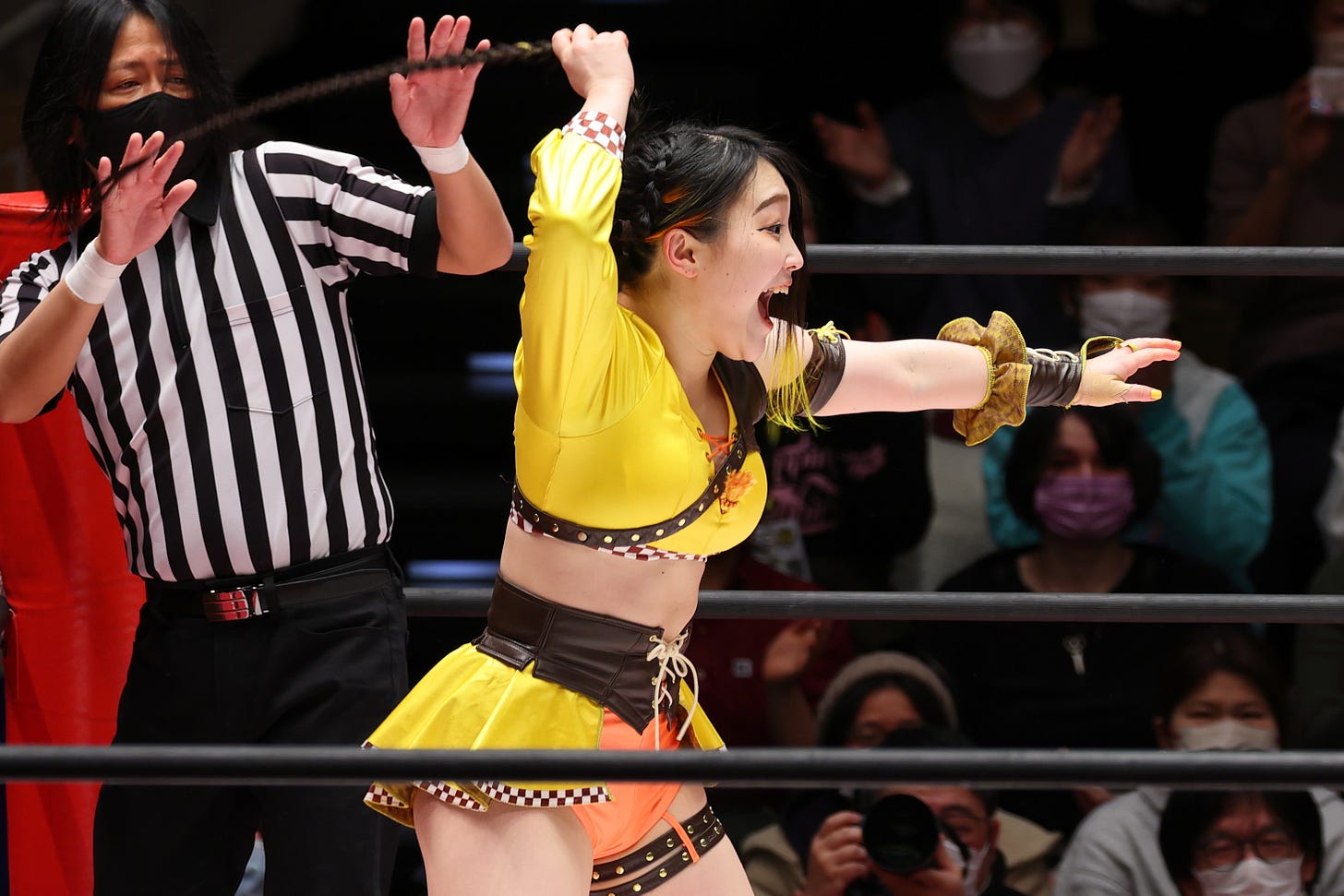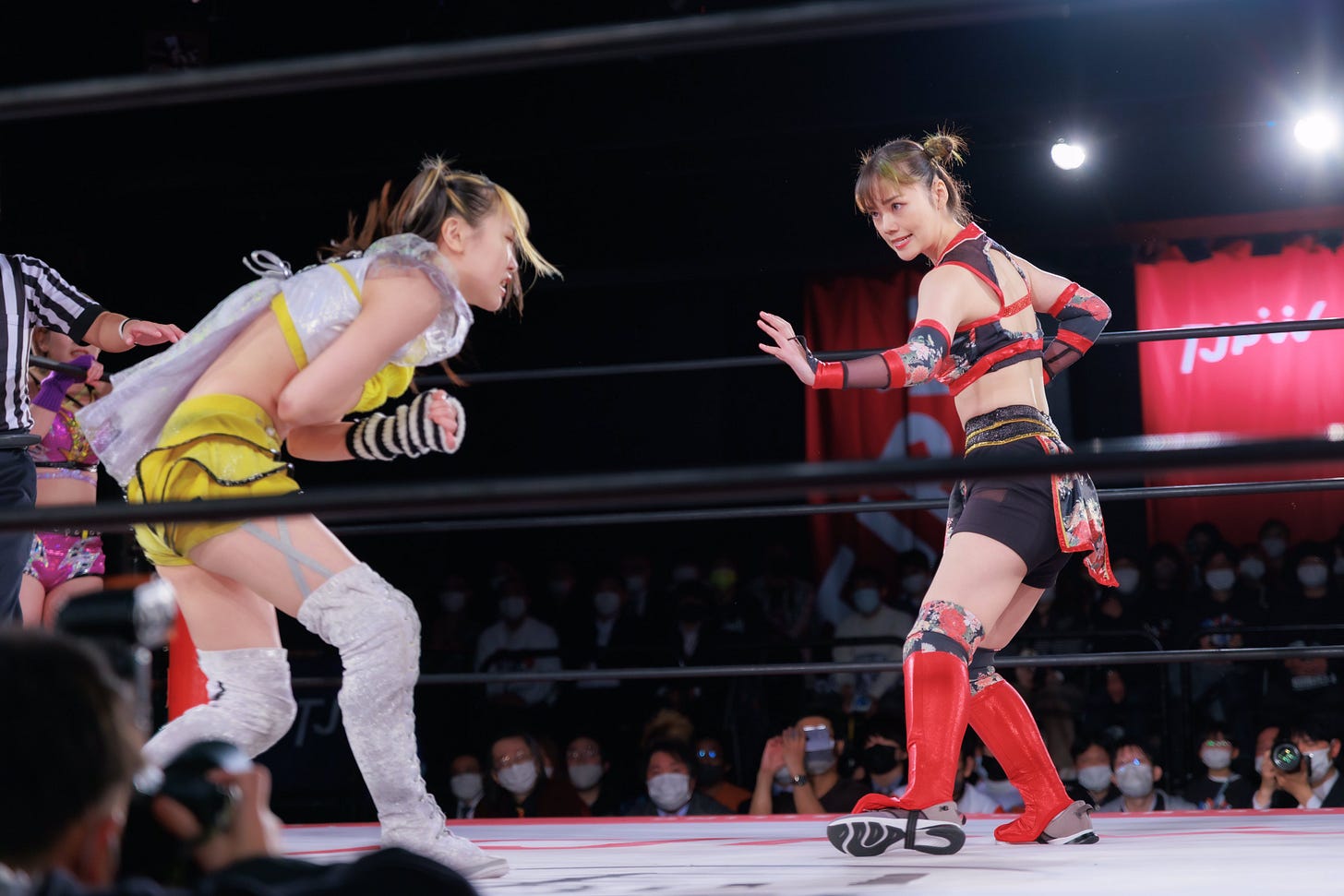Flupke's Month in Wrestling: January 2023
ActWres girl’Z - Ice Ribbon - STARDOM - Tokyo Joshi Pro
Front Matter
Each image used in this newsletter is linked to the Twitter account responsible for it: simply click through to bring up the original post. If you are a photographer whose image I have used here, and you do not grant me permission to reproduce your work, please let me know (Twitter: @FlupkeDiFlupke) and I will remove it. Thanks!
写真家さん、ここにイメージが写すことが許可しなければ聞いて下さって私は大至急除きます (ツイターの @FlupkeDiFlupke です)。ありがとうございます!
Subscribe to Marshmallow Bomb for free to receive all our posts direct to your inbox, or donate $5 a month to access the full archive. A portion of every subscription supports Amazon Frontlines, an organisation dedicated to working with Indigenous peoples to defend their way of life, the Amazon rainforest, and our climate future.
The Michelin Guide Star System
For the New Year, I’m bringing back the star rating system I used for all my match reviews between 2017 and 2019. It’s derived from the famous Michelin Guides, only with the words “cooking” and “cuisine” swapped out for “pro wrestling”:
One star - Very good
cookingpro wrestling in its category.Two stars - Excellent
cookingpro wrestling, worth a detour.Three stars - Exceptional
cuisinepro wrestling, worthy of a special journey.
Or, to break it down a little further: a three star rating means a match which I’d include in a review of the decade at large. Something epoch-defining, like Kairi Hojo vs. Meiko Satomura, or Team Marvelous vs. Team Sendai. I may not award a three star rating all year. Two stars means a likely place in my end-of-year top 10: Yuka Sakazaki vs. Miu Watanabe from last year’s Tokyo Princess Cup was a two-star match. One star is still an honour: a lot of matches I write about in this newsletter appeal to me because of one little detail, or because they illustrate some broader idea; a one star match is a match that was very well executed from start to finish, without necessarily transcending its context. A one star match is a match you’d show to someone who wanted to get into a promotion and say “here, here’s that promotion done well”.
And now on with the first newsletter of 2023!
ActWres girl’Z
Miku Aono & Kouki vs. Misa Matsui & Naho Yamada
29.12 / Korakuen Hall
At first glance the ActWres girl’Z relaunch was intriguing, but after this show it feels miraculous. There isn’t a missed beat on this whole card; everyone in the company seems to know exactly what they’re doing, and be perfectly comfortable in their roles. We begin this show with a rookie debut, and with Kanamic, who debuted in October, showing real rookie fire against Natsuki, who only has a couple of years under her belt herself but who excelled in her mid-tier veteran role here. Next up are some comedy antics courtesy of Asako Mia and Rensan; before Allen, MARU and Bulldozer Todoroki put on their best Gokuaku Domei tribute act, victimising Mii, Nagisa Shiotsuki and Sakura Mizushima to the sounds of some genuinely affecting screaming at ringside.
Everything lands. We’re given three very distinct types of match, strung together with perfect pacing and a sense of rising momentum, but enough space for individual performances (like Shiotsuki's chops) to shine. All from performers that are mostly less than a year in. Fuka and co. are playing around and figuring out their distinct promotional identity while nailing the fundamentals completely, and that combination of factors makes them THE most exciting promotion in joshi as we move into this new year.
The momentum keeps building through a series of tag matches with gradually escalating stakes (the semi-main is a tournament final; the match before this sees Ayano Irie defending the homestead against Asahi, invading from Ice Ribbon), and then we get to this main event, which is the best match on the card, as it should be. You could make a very strong shout for all 4 performers being the main character in this. Kouki is tall and strong, and gets the win. Aono is the Ace Elect. Naho Yamada is the rookie stepping up and looking to make a splash. Misa Matsui is the underdog with a chip on her shoulder, every bit as experidnced as Aono but not held in the same esteem: as much as these distinctions hold any sway in joshi, something about Matsui just screams “cruiserweight” to Aono’s heavyweight. This felt like a breakout match for Matsui in particular.
Everyone here carries themselves like they’re focused on telling their own story, which could be a mess in other contexts but works in this everything-up-for-grabs territory. But what really tipped this over the edge for me on rewatch was the extent to which Aono and Matsui seem determined to run through each other, as if, even at this early stage of the rebuild, even before the singles title has been reintroduced, we’ve already arrived at a place where winning is a matter of life or death, and worth the risk of mutual destruction. It’s not a sophisticated observation, but Aono and Matsui kicked the absolute shit out of each other here, and while that style no longer has the same impact it once did on me when I watch wrestlers I expect it from - Arisa Nakajima, for instance - the violence really got under my skin here, because these are actwres girl’z. It’s by no means how I expected this match to pan out, although maybe we should expect it from AWG now, because in a very short space of time they’ve succeeded in building a sense of in-ring escalation comparable to what’s been going on in Tokyo Joshi for the past few years (more on this below). If you’re not watching this stuff yet, I cannot stress enough how much you should be.
Michelin Star Rating: ★
Ice Ribbon
Yuuki Mashiro vs. Suzu Suzuki
31.12 / Korakuen Hall
I loved Yuuki Mashiro. Anyone who’s read this newsletter for any length of time knows that. From her debut in August 2020 through to the injury that kept her out of action for the best part of three months last summer, she was consistently one of the funniest, most interesting, most delightfully inscrutable presences in pro wrestling, both in and out of the ring. I named my record label, Profound Mystery after her (tapes available at Bandcamp!). I’m sad that she won’t be on our screens anymore, and this farewell match, which was also a happy homecoming for prodigal daughter Suzu, and a repeat of Mashiro’s first singles match, was the perfect send-off. The little spot at the beginning where Suzu had Mashiro in a wristlock and Mashiro was looking back and forth at the crowd as if she was about to tap out was a lovely little reminder of what a fun, unpredictable character she was when she first burst into our lives. And she signed off as only Mashiro could sign off, wandering off with a cheery, guileless “see ya later!” before she’d had a chance to receive her customary ten bell salute. I’m sad for me and happy for her; it was funny, it was bittersweet. All of this is very simple indeed.
What’s more complicated is this: Mashiro rallies beautifully down the finishing stretch, and the trigger for one final flurry of crafty roll-ups is an attempted Tequila Shot, which Mashiro cleverly escapes. Then, once that well has run dry, Suzu connects with her second attempt, and Mashiro kicks out at two point nine. The Tequila Shot acquired near-legendary status in 2022, both because it’s such an eye-catching move, and because it formed part of the story of Suzu’s clashes with Giulia in STARDOM - I’m not sure how much of the actual story of what went down in 2018 got through to those STARDOM fans that weren’t following Ice Ribbon at the time, but Tequila Saya’s role in both Suzu and Giulia’s careers was at least highlighted in the in-ring story they set out to tell across those Prominence vs Donna del Mondo tag matches and the 5 Star Grand Prix block decider in October. A very large audience now recognises the Tequila Shot as a Move Of Importance.
Suzu inherited the move at the end of Saya’s retirement match, three Ribbonmanias before this one. That was the same match where Mashiro - then Trainee White - made her first in-ring appearance. It was a historic night, one which belongs at the heart of the version of Ice Ribbon that flourished between roughly 2018 and 2021. It was the night which prefigured Suzu’s transformation from a bike girl into a champion, a night where Ice Ribbon outdrew STARDOM at Korakuen Hall, despite having one of their top prospects ghosted away from under their noses. And now all that’s left of the legacy of that show lives outside of Ice Ribbon proper - Saya is retired from her promotional duties as well as her in-ring ones, and for all we know Suzu’s return to her promotion of origin could have been a one-and-done deal, organised begrudgingly as Mashiro’s final wish. You can continue to follow the story of Suzu and Giulia’s rivalry if you like, but it’s going to have to come with a side-helping of Rossy holding up the Red Belt.
The fact that Mashiro kicks out of the move feels like more than just a callback to her point of origin on one of the landmark nights of Suzu’s early career: it’s also a sign of how much she’s grown since Suzu defeated her by six falls to nil at Ueno Park in August 2020. She forces Suzu to bring out her A-game, holds her own right til the bitter end, and retires a champion. But she retires nonetheless, and that last Tequila Shot felt like one last nod to Suzu and Mashiro’s shared legacy, the good old P’s Party days, before they’re confined to history for ever. I thought I was ready to let go of one of my favourite wrestlers, before this one small moment really highlighted the magnitude of what we’ve lost. At least with joshi wrestling you can be reasonably confident that a new weird rookie and a new weird rookie platform is always just around the corner.
Saori Anou vs. Asahi
31.12 / Korakuen Hall
A match that did the simple things very well, as befitting of a booking angle that’s essentially very little removed from hometown heroes in the territories taking on Harley Race or Ric Flair for the Ten Pounds of Gold. Anou’s position as the first outsider in over a decade to hold Ice Ribbon’s top championship is a black mark against the company (in kayfabe, let’s be clear); Asahi is on her second tilt at the title this year and carries the hope and pride of all her dojo-mates on her young shoulders. She gets off to a solid start, but it’s in the third act, when she finds herself desperately fighting from underneath, that our hero and this match really come into their own.
There’s nothing here that you haven’t seen before - the fighting spirit pop-ups, the dogged desperation reversals, the doomed kick-out at one - but it all connects as it should, and in the moment it makes Asashi feel almost as important as Miu Watanabe did in 2022’s Match Of The Year. That kick-out at one is a particular highlight - Asashi sells the impact of it to great effect, and in doing so reminds us all that kicking out at two gives you precisely one more second of vital recovery time. She loses, but in doing so she feels like more of a Big Match Wrestler than she did at Yokohama Budokan in May, and adds some extra emotional heft to what I imagine will be a fairly long-term arc: Ice Ribbon’s hunt for a home-grown champion.
Michelin Star Rating: ★
STARDOM
Oedo Tai (Momo Watanabe, Saki Kashima & Starlight Kid) vs. Prominence (Risa Sera, Suzu Suzuki & Hiragi Kurumi)
29.12 / Ryogoku Kokugikan
Recent plunder matches in STARDOM have gone in for silliness and antics, but this No Disqualification match for the Artists of Stardom titles was less Buster Keaton and more golden-era Simpsons. It was a constant revolving door of one-on-one match-ups, with Suzu and Saki largely taking the lead during the climax, and with big weapon shots arriving with the regularity of gags in a Jay Kogen & Wallace Wolodarsky script. Everything felt geared up towards getting to the next high spot, but there was next to no downtime - so little so, in fact, that the cameras entirely missed Momo and Kid getting dumped through an elaborate construction of steel chairs.
No cards were left on the table. Major threats were introduced and then delivered on almost instantaneously. Within the first five or so minutes Kid had run over the entire opposition with a bicycle and Momo had used a barbed wire baseball bat on Sera. Suzu piledriving Saki off the top rope and through a table was practically a transitional move, in time-honoured AJW style. I wrote a massive Twitter thread recently about how well Tokyo Joshi Pro have kept their powder dry over the past half-decade or so, giving moments like the Miyu Yamashita/Yuka Sakazaki “shoot” headbutt spot a genuinely shocking impact (again, more on this below). My admiration for that approach ought to mean a match like this would rub me up the wrong way, but that isn’t the case, partly because I contain multitudes, and partly because, in spite of the general air of hyper-inflation, this match did escalate with tangible care and craft.
The bang-bang style of the opening ten minutes gave it the air of a match you’d show to friends who weren’t particularly interested in wrestling, to whet their whistle for slower, more considered stuff later down the line. But the final, climactic sequence - where Kashima’s Revival almost proved deadlier than any foreign object, and Suzu had to be dug out by a perfectly-timed kendo stick shot from her Hyakkaryouran partner - was enough to get even a seasoned (or jaded) viewer like me out of my seat. This had more in common with a top-notch High Speed match than with the deathmatch style Prominence specialise in on their own shows - there were a million moving parts here, but in the end they came together coherently, in a picture that felt subtly different to anything we’ve seen before.
Michelin Star Rating: ★
Ami Sohrei & Nanami vs. Momo Kohgo & Momoka Hanazono
20.01 / Belle Salle Takadanobaba
The post-match scene where AZM burst in and dismissed the winning team because she was dying to catch up with “Momozono-chan” was maybe a little bit more on the nose than was fully intended; no disrespect to Sohrei, Nanami and Kohgo, but Momoka was on another level entirely here, and this match was a great case study for why she’s one of the most interesting talents of her generation. Nothing she does ever feels like going through the motions, although admittedly, she wasn’t tasked with any of the really functional bits of this encounter.
The match opens with a really beautiful exchange: Sohrei challenges Momoka to a test of strength, showing off her height advantage, so Momoka sneakily whacks Sohrei in the stomach and attempts to high-speed shoulder-block her off her feet; when this doesn’t work Momoka briefly tries pretending to cry, but quickly realises this is getting her nowhere and opts instead to in tempt Sohrei into running the ropes herself; the resulting high-speed exchange ends up about 50/50, but Momoka does succeed in getting the Big Girl off her feet several times.
Throughout the whole thing, you feel like you can see Momoka’s thought process on clear and vivid display: nope, that’s not working, time to try this instead. And I feel like I’ve said this a million times about both Momoka and her sometime tag partner Mei Suruga, but one of the continually impressive things about her is her ability to breathe new life into hoary old routines: see for instance the chop/forearm exchange with Sohrei, which Momoka oversells to slapstick, histrionic perfection. It’s a big thing to say about a pointedly minor wrestler, but I feel like I understand better what pro wrestling is when I’m watching Momoka do it.
Tokyo Joshi Pro
HIMAWARI vs. Yuki Aino
04.01 / Korakuen Hall
Yuuki Mashiro is gone, and HIMAWARI feels like the most forthcoming replacement. It’s not that they’re all that similar, and I’m not necessarily predicting that their careers will run in parallel. It’s more that HIMAWARI has stepped into the space that the Gacha King has left open in her absence. At the time of writing HIMAWARI still doesn’t have a Cagematch profile, and has roughly one hour of total in-ring experience. In the six minutes she was given here, though, she was responsible for one of my favourite moments of the entire show (and I know I’m not alone in this assessment): the spot where she tried to bamboozle her opponent by doing more drop-downs than you’d expect in an opening exchange.
Proportionally, a very high percentage of her total wrestling output to date has been spent doing things that are funny and surprising and interesting enough to stand out on a jam-packed card. It’s not just the drop-down spot, but also her ring entrance, where she managed to conduct the crowd in two separate clap rhythms, and that moment in the match where she twirled her braids around to power herself up but nothing came of it. The fact that her favourite move was listed as “-”, which was actually the case for quite a few of the performers on this show, but felt like a hilarious bit the first time it popped up on screen. Also her gear rules, yellow is my favourite colour, and sunflowers are one of my favourite flowers. Mashiro started out with this kind of batting average, and kept up the momentum more or less unabated until her retirement. I’m now in the familiar position (see also: Mei Suruga, Lulu Pencil, Mio Momono, Maki Itoh, Suzu Suzuki, etc.) of needing to watch everything this rookie does until such a time as she becomes just another normal wrestler.
Yuka Sakazaki vs. Miyu Yamashita
04.01 / Korakuen Hall
I don’t think this is the match that decides who Tokyo Joshi’s GOAT really is, but it certainly made itself part of the conversation. Sure, Miyu still has a 3-2 lead overall on her opponent here, and as we established in some previous newsletter, Yuka is 2-1 up on Shoko and Shoko is 2-1 up on Miyu, so if we’re looking purely through a numbers lens then Miyu takes it on goals scored. But Yuka also has those tag title reigns to factor in, AND she’s won the Tokyo Princess Cup now, and is a three-time Princess of Princess Champion just like Miyu. Imagine that these two are thrashing out that debate in the ring here and the stakes become palpable - we’re not just repeating main events of the past, we’re onto a new chapter now. Like Lionel Messi at his last World Cup, Miyu and Yuka are both settling their legacies while simultaneously performing at a higher level than ever before. This match will be spoken about when the history of the golden years of Tokyo Joshi Pro is told in decades to come, but for the duration of its sixteen minutes (yes, only sixteen!), both performers felt entirely locked in the moment.
They only had eyes for each other. The task at hand was simply too difficult, too all-consuming to think about anything else - the approval of the fans or the lure of star ratings. All the best matches, at least the ones that fit into the “intense interpersonal battle” category, feel that way. But all the best matches also tend to gain a lot from context, and this one was no exception. So much of the meaning in these moves came from what had come before - not just the history between these two, the flashbacks to the Akihabara days glimpsed in the opening video package, but also the seven other matches on this card. We started with two rookie debuts, and we ended up with a match between the two frontrunners for first place on TJPW’s all-time list. Everything in between told the story of how you get from that A to that B - via comedy shenanigans, via number one contendership battle royals, via opportunities to prove yourself against larger-than-life outsiders.
The Princess Road is for everyone, and nobody is moving backwards, not even Neko Haruna. HIMAWARI probably won’t ever reach the stage that Miyu and Yuka currently find themselves at, and we’ll probably be delighted by her diversions. But if anything she does is ever going to land she at least has to carry herself like she wants to get there. The point Miyu and Yuka occupy at the top of this card is the point that everyone else on the regular roster is striving towards. Eventually more than a few of them will reach it. But what’s characteristic of Miyu and Yuka (although not necessarily true of their previous singles matches, which have tended to leave a little to be desired) is that they stood at this junction, and then the bell rang, and they blasted right past it, so far down the road that all anyone else can see is the dust they kicked up.
This might have been the most violent match in the history of this championship. Miyu’s early, devastating spill to the outside would draw gasps in any promotion, but one of the other really big moments here drew its power from the fact that a spot which is over-used in other joshi promotions is hardly ever seen here: I’m talking, of course, about Miyu’s top-rope headbutt. Miyu’s Crash Rabbit Heat to the back of Yuka’s head was sickening, but Yuka’s strikes in the closing stretch looked no less brutal. You take that spirit of collegial, boundary-pushing competition that runs throughout the whole promotion, and you take Miyu and Yuka’s exceptional desires to always be at the very forefront of whatever progress is being made, and you grind all that up and what you’re left with is this vicious slugfest, with both competitors pushing themselves far beyond what’s healthy, and neither one backing down an inch. There’s a look on Yuka’s face just after she hits the Magical Merry Go-Round, a kind of open-mouthed grimace, which expresses everything you need to know about how much this last stand is costing her, and how much she needs to carry on. That’s the beating heart of Tokyo Joshi Pro right there. She might be the GOAT after all.
Michelin Star Rating: ★★
Rika Tatsumi, Miu Watanabe & HIMAWARI vs. Suzume, Arisu Endo & Kaya Toribami
14.01 / Otemachi Mitsui Hall
In her matches since Korakuen Hall HIMAWARI ditched the drop-down spot and weaponised that taunt she does where she swings her braid round and round - appropriately, she discovered this potential for pigtail-based ultraviolence in a singles match against sneaky hardcore bastard Nao Kakuta. Here, she appeared to be warming up for another hair-whipping when Rika rushed the ring and immediately contrived a spot where the rookie gets involuntarily bodyslammed onto a prone opponent. Coming more or less out of nowhere, the original hair-whipping spot carried a strong whiff of Rika's own signature brand of attack - that shit-eating grin opening out into a full-force commitment to a kind of violence that seems a little beyond the pale even in a wrestling ring (remember the mark Bianca BelAir left on Sasha in their Wrestlemania main event?). Rika saw a mile off that HIMAWARI was coming for her crown, and had no choice but to nip it in the bud.
Free WiFi (Hikari Noa & Nao Kakuta) vs. #121000000 (Miyu Yamashita & Maki Itoh)
14.01 / Otemachi Mitsui Hall
On paper, Miyu skull-kicking Nao and pinning her to eliminate everyone’s tournament dark horses at the first hurdle feels like something we’ve seen before. It calls for that time-honoured custom of doubting Tetsuya Koda’s ambition with the booking pencil, of decrying TJPW’s conservatism in putting rising stars over old favourites. In practice, this was simply a way of ensuring that the first round of Max Heart tournament fixtures ended with a bang: with a match that could easily have gone either way, and where both teams were forced to dig deep and show the kind of elite synchronicity they’re capable of.
Looking at the tournament bracket before this opening weekend, I was struck by the strength of the tag division that TJPW has been building under our noses this whole time - there are no first-time pairings here, and out of the ten teams in the competition there’s only two that haven’t at least challenged for the tag titles on some prior occasion. In 2023 it’s simply not possible to skim through the opening rounds of this tournament and only eliminate jobber teams - even Raku put in a memorable big match performance in the semi-main event, which saw her throwing vicious forearms like some product of the DIANA dojo. Sooner rather than later hearts would have to be broken (I myself have hardly been secretive about making Free WiFi favourites to reach the final), and this match was a delicious way to deliver that first really crushing blow.
Karate Pals (Moka Miyamoto & Juria Nagano) vs. Daisy Monkey (Suzume & Arisu Endo)
19.01 / Shinjuku FACE
Fittingly for a month where TJPW celebrated a major anniversary, this match transported me back in time, to the early days of DDT Universe and the tournament to crown the inaugural Tokyo Princess Tag champions, and that feeling of watching in-ring work that you know isn’t a finished product, that’s still a little rough around the edges, but which is full of colour and character and, most crucially of all, full of future. The main event of this show was a heavyweight clash, pitting the recently dethroned tag champions against the winners of last year’s Max Heart tournament, but this match was more exciting, because it represented a relatively rare point in TJPW’s ongoing narrative where two up-and-coming prospects go directly head to head, with a significant amount riding on the result. Like that match between Dragon Bombers and Miraclians, this didn’t fully measure up to the kind of in-ring standards that have been set by Yuka, Shoko and Rika in the intervening years, but I can well imagine it taking on “foundational text” status in years to come.

